Contents
Shanghai Forum 2012: A Great Success
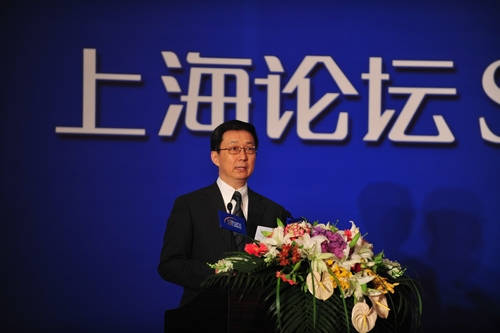
On the morning of May 28, the three-day Shanghai Forum 2012 concluded uccessfully. It is reported that this year's Forum has set a record in range of topics and the number of guests in the seven years' history of Shanghai Forum. More than 500 guests in political, business and academic areas have heated and deep discussions about how could Asian countries further cooperate and choose strategies about economy, finance, trade, politics, international relations, laws, urbanization, social development, population, ecological environment, energy, etc. in the next decade.
Paul Volcker, former Chairman of U.S. Reserves, and Adam Przeworski, Professor of Political Economy at New York University, gave keynote speeches at the closing ceremony. Zhu Zhiwen, Chancellor of Fudan University, and Park In-kook, President of KFAS, delivered addresses. Lin Shangli, Vice President of Fudan University, hosted the closing ceremony.
Shanghai Forum 2012 Consensus was officially released at the closing ceremony. It was pointed out in the Consensus that Asia's position and function in the global economic order is continuously growing. Each Asian nation should vigorously speed up transformational development and deepen Asia's internal collaboration to ensure sustainable growth of economy in the next ten years. It was also stated in the Consensus that each Asian nation’s government should play a positive role in dealing with crises, reforming the international currency system, restructuring the global economic order, and effectively overcoming energy shortage. It was suggested in the Consensus that to realize successful development and sustainable economic growth in 2011-2020, Asian nations should endeavor to utilize fully the benefit in population and urbanization, create and accumulate the benefit in systems innovation.
TOP
Fudan Co-established China-Harvard Medical School Translational Medicine Consortium
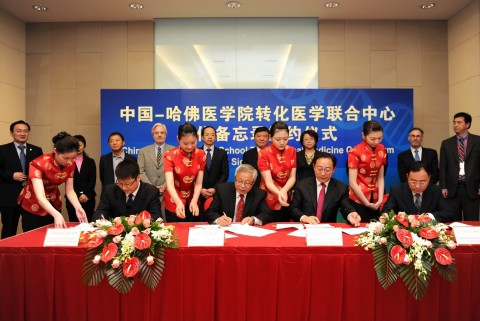
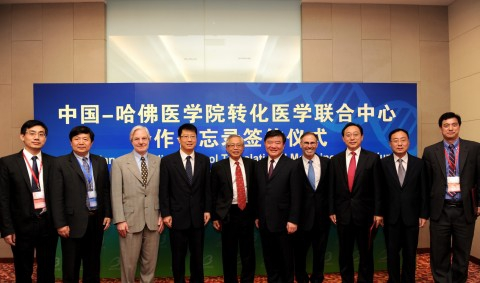
On May 10, China-Harvard Medical School Translational Medicine Consortium MOU Signing Ceremony was held at Shanghai International Convention Center.
During the ceremony, President of Chinese Academy of Medical Sciences and Peking Union Medical College Academician Cao Xuetao, Vice President of Fudan University and Dean of Fudan University Shanghai Medical College Gui Yonghao, Vice Chancellor of Shanghai Jiaotong University School of Medicine Zhang Xiong, respectively signed the MOU with Executive Dean of Research, Harvard Medical School William W. CHIN on behalf of their medical schools.
China-Harvard Medical School Translational Medicine Consortium will establish a new cooperation mechanism to launch cooperative researches on the diagnosis, treatment, prevention and pathogenesis of type 2 diabetes, immunological disease and malignant cancer (cancer of lung and liver, and leukemia). It will also boost cooperation and exchanges in the cultivation of talents in translational medicine and joint master degree programs.
Minister of Ministry of Health Chen Zhu witnessed the signing ceremony.
TOP
Shanghai Center for Mathematical Sciences Founded
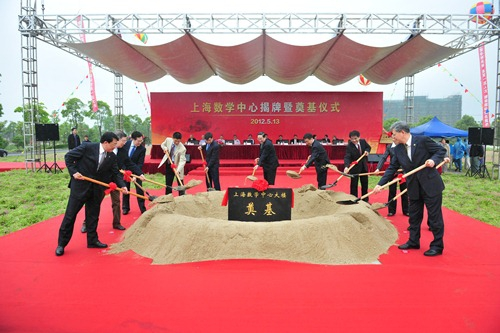
On the afternoon of May 13, the opening ceremony and foundation-laying ceremony of Shanghai Center for Mathematical Sciences was held at Jiangwan Campus of Fudan University. State Councilor LIU Yandong sent a congratulatory message. Mr. YU Zhensheng, Secretary of CPC Shanghai Municipal Committee, Mr. HAN Zheng, Major of Shanghai City, Mr Zhang Laiwu, Vice Minister of Education, Prof. ZHU Zhiwen, Chairman of Fudan University Council, Prof. YANG Yuliang, President of Fudan University, and others attended the ceremony. The headquarter of the center was located at Fudan.
LIU Yandong pointed out in her congratulatory letter that General Secretary Hu Jintao made important instructions on the establishment of the Center for Mathematical Sciences, suggesting that the party and the country attaches great importance to the development of the basic disciplines of mathematics.
Mayor HAN Zheng said that technology and innovation was the engine of modern urban development. Mathematics is the basis of all natural science, modern science and technology development is inseparable from the development of mathematics. Therefore Shanghai Center for Mathematical Sciences has a long way to go.
President YANG Yuliang believed that under the strong leadership of the central government and Shanghai municipal government, Shanghai Center for Mathematical Sciences will turn into a high-level mathematical technology innovation center, the mathematical training center and the international academic exchange center.
It was told that the Shanghai Center for Mathematical Sciences will focus on some of the important topics at the forefront of overlapping areas of pure mathematics, mathematics and other disciplines. The mission of the center is to recruit outstanding scholars both from home and abroad, to accumulate high-quality innovative talents and teams, and to train outstanding young mathematical talents, to carry out the original innovation, and to make world-class research.
TOP
European Day Held at Fudan
Hosted by Shanghai Center of French Higher Education, European Day 2012 was held on the afternoon of 15th May in the Guanghua Building at Fudan University. The event was co-organized by DAAD, Fudan Austrian Center, Fudan Foreign Affairs Office, Fudan Center for European Studies and the Hungarian Consulate General in Shanghai with the aim of promoting the communication and cooperation between European countries and Fudan.
The opening remark was delivered by Zhu Chouwen, Director of Fudan Foreign Affairs office. He extended a warm welcome to all the representatives from European countries and expressed his expectation of more such exchange activities at Fudan in the future. Besides, the representative from E.U. introduced the Erasmus plan concerning student exchange. And then a brief introduction of Fudan Center for European Studies and Fudan Netherlands Center was given by professor Ding Chun, Director of Fudan Center for European Studies.
In the following hours, detailed information about culture, travelling, studying aboard was introduced respectively by the representatives from France, Germany, Hungary and Austria on their countries. The event was well received among students.
TOP
"Building Educational Bridges between Mexico and China" Held at Fudan
On May 22, 2012, the Tecnologico de Monterrey, the largest private University in Mexico and Latin America (www.itesm.mx) hosted the event “Building Educational Bridges between Mexico and China” at the 40th birthday of the establishment of diplomatic relation between Mexico and China. Faculty members and students from both universities, together with representatives from institutes and companies of both conutries took part in the event.
The whole event was a combination of lectures, performance and interesting activities. The opening speech was about the history of the friendship between our two countries. It is an introduction of the history of mutual relationship of two countries back to 100 years ago. The talk regarding history was followed by an introduction of economics and tourism in Mexico, presented by the representative from Promexico.
Bimbo, one of the biggest Mexican companies in China, attended the event as well. The general manager of the company is an alumnus from Tecnologico de Monterrey.
During the activities in the afternoon, Chinese and Mexican students presented artistic performance together, showing the diversity in culture. All the Chinese students who performed on the stage were exchange students to Mexico themselves, while all the Mexican students also exchange students to China.
TOP
Fudan Ranks High in an Academic Citation Index in 2011
Recently, Fudan University Office for Research of Social Sciences received a congratulation letter from Center for Evaluation of Research in Social Sciences, Renmin University of China, for Fudan’s high ranking in Citation Index of Newspaper and Journals in Academic Papers in year 2011.
For the whole year, a total number of 9955 papers from 702 Universities and Institutes were cited. Fudan ranked in the third place with 317 papers cited with a comprehensive index of 0.709048.
Among other Chinese universities and institutes of higher education, Fudan also stood out for high rank of being cited in the field of Philosophy, Economics, Politics, Sociology, Marxist theory, Chinese Language and Literature, Journalism and Communication, history and public administration. Specifically, Journalism and Communication had 16 citations and ranked as 1st in both the amount of citations and the comprehensive index. Marxist Theory had 24 citations and ranked as 2nd in both the amount of citations and the comprehensive index. Philosophy, Economics and Politics had citations of 44, 66 and 41 respectively and all ranked as 3rd in both the amount of citations and the comprehensive index. Chinese Language and Literature had 33 citations and ranked as 6th for the amount of citations and 5th for the comprehensive index while Sociology had 11 citations and ranked as 6th for the amount of citations and 7th for the comprehensive index. Lastly, History had 26 citations with the rank of 7th for both amount of citations and comprehensive index.
TOP
New Research Unlocks Birth of a Neuron
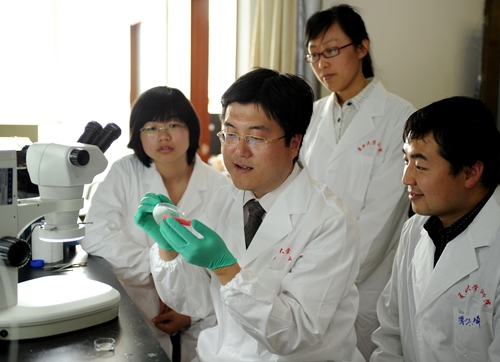
A study by Chinese and US researchers has shed light on a little-understood characteristic of neurons as they develop in the brain of an infant – findings that may point to new ways of tackling childhood epilepsy, autism and mental retardation.
The team – led by Dr Yu Yongchun from Fudan University’s Institute of Neurobiology and Dr Song-Hai Shi from the Memorial Sloan-Kettering Cancer Centre in New York – focused on the early stages of neurons in the neocortex, which is involved in functions such as perception, motor commands and language. Scientists already have a relatively detailed picture of how mature neurons function, but the workings of neurons in the first stages of their development remain poorly understood. As the research suggests, this may hold the key to understanding complex neurological disorders that might arise later in a person’s life. In their research, the team zoomed in on “sister” neurons, which are all generated from the same mother cell. Sister neurons develop specific chemical synapses – junctions between two neurons – preferentially with each other rather than nearby non-siblings. This lineage is essential in the creation of what specialists call microcircuits – groups of nerve cells organized to carry out certain functions. “Initially we guessed that it was the electrical signals that connected these sibling neurons at their early stages. Our experiment has proved this right,” Yu told the South China Morning Post.
The study will appear in the print edition of Nature journal on June 7. Yu and his colleagues injected a small amount of retrovirus into the brains of mice embryos to “paint” neural progenitor cells – the “mother” – and its offspring. These painted neurons would show up fluorescent green under the microscope. “In this way we could tell which neurons were siblings,” Yu said. Among the 100 mice embryos that were tested, half received a retrovirus modified with a section of ribonucleic acid (RNA) that forced the electrical signals to stop functioning. The retrovirus injected in the other half of the mice did not carry that RNA. Seven days after the mice were born, researchers found that in the first group, electrical synapses evolved into chemical synapses. But the second group formed far fewer electrical synapses. “We concluded that without electrical synapses, chemical synapses can’t be formed,” Yu said. “It means that microcircuits in brains will be damaged.” Their research verified for the first time that the electrical synapses that neurons use in these early stages are essential for the later formation of chemical synapses.
The team suspects that malfunctions with electrical synapses are tied to some neural diseases. Other scientists have shown that electrical synapses play an “adverse” role in childhood epilepsy. Yu and his team theorised that the disease could be the result of electrical synapses failing to disappear at the proper stage of aneuron’s development, and instead continue to exist. The same electrical-synapse failure might be linked to autism and mental retardation, according to Yu. Yu said the team was already doing new experiments to determine whether there was a link between electrical-synapse abnormality and changes in behaviour. “It will be very interesting to examine whether defects in such microcircuits occur in disease models,” said Dr Hu Hailan, a leading neuroscientist affiliated with the Chinese Academy of Sciences, who is not associated with Yu’s study. Dr Liu Yaobo, from the Institute of Neuroscience at Soochow University in Suzhou city in Jiangsu province, said the latest study was inspirational. Liu said the interesting thing about the study was “that they considered electrical synapses” while other studies focused on genes and molecules to investigate the formation of microcircuits.
TOP
Prof. LIU Luming Wins an Authoritative Award in Medicine
Recently, the winners of Science and Technology Award 2011 provided by China Society of Integrated Traditional Chinese and Western Medicine were announced. This award is the most authoritative one in the field of integrated traditional and western medicine. Fudan Cancer Hospital’s project named Clinical Application of Integrated Traditional and Western Medicine with Clearing Heat and Eliminating Dampness as its Main Method to treat Pancreatic Cancer won the first-rate award. Altogether 37 projects out of 102 ones involved won the award, with 6 as winners of first-rate award.
The Fudan project was accomplished by Prof. LIU Luming, CHEN Zhen and MENG Zhiqiang. Summarizing the research results of the previous 10 years, inheriting and developing the academic thought of Prof. YU Erxin, a famous TCM doctor about using traditional Chinese Medicine to treat malignant cancer including pancreatic cancer, after long-term epidemiological survey and clinical practice, the professors came up with a comprehensive treatment plan with clearing heat and eliminating dampness (QYHJ) as its main therapy. They made a hypothesis that the stagnation of dampness-heat was the major pathogenesis of pancreatic cancer, based on which they thought that clearing heat and eliminating dampness was the primary principle of treating pancreas cancer. QYHI prescription strictly follows that principle. Clinical study on 1500 patients shows that comprehensive treatment plan with QYHI as its main therapy can obviously prolong the life span of the patients, providing more evidence-based medical practice to verify the hypothesis on the pathogenesis of pancreatic cancer. Researchers also found that the patients of pancreatic cancer with higher expression of Ski gene had better therapeutic effect. This finding can be used to screen the patients and find out who are suitable for this treatment.
Evaluation experts think highly of this project because it has broken through the traditional understanding that pancreatic cancer was originated from spleen deficiency and qi stagnation, proposed and validated the theory that stagnation of dampness-heat was the pathogenesis of pancreatic cancer, greatly improving and developing the theories of the pathogenesis of pancreatic cancer. Till now, this project achievement has been used in 8 tertiary hospitals and got 1 national patent. According to a third party achievement appraisal committee, the research results have reached the international advanced level in general and part of them has reached international leading level.
TOP
Australian Ambassador to China Visited Fudan
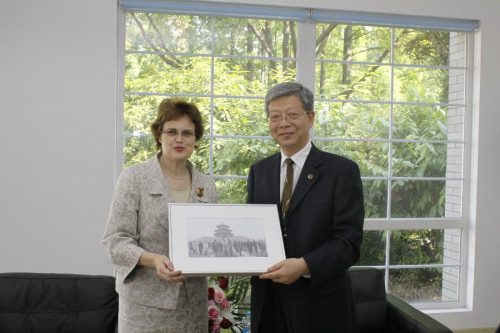
On May 18, 2012, Madame Frances Adamson, Australian Ambassador to the People's Republic of China, visited Fudan University. Prof. YANG Yuliang, University of Fudan, received the delegation. Mr. Guy Humphrey, first secretary ,and Mrs. Eliza Chui, consul of educational affairs from Australian Consulate General to Shanghai, joined the meeting.
Prof. WU Xinbo, Deputy Dean of School of International Relations and Public Affairs, Prof. JI Peiying, Director of College English Center, together with staff from Fudan Foreign Affairs Office, attended the meeting. Exchange students from NSW and Queensland University were also invited to join the meeting.
Prof. YANG briefed on the cooperation between Australian Universities and Fudan University, speaking highly of the high level of bio-medicine research in Australia. He sincerely encouraged the high-level cooperation in this field between two institutes. During the meeting, Madame Adamson mentioned Adelaide University, from which she graduated. The university is also playing a leading role in bio-medicine research, and boasts five Nobel Prize winners as its graduates. She looked forward to the cooperation between Adelaide University and Fudan University.
It is the 40th anniversary of the establishment of diplomatic relations between Australia and China this year. Ambassador Adamson presented Fudan University a picture as a gift, telling the story of the first Australian official visit to China.After the meeting, Madame Adamson talked with the exchange students, asking about their study and life at school as well as in Shanghai.
TOP
Prof. Rod Ellis Gives Talks at Fudan

On May 14 and 15, Prof. Rod Ellis, Deputy Dean of the Department of Applied Language Studies and Linguistics at the University of Auckland, New Zealand visited Fudan University.
During his visit to Fudan University, Prof. Rod Ellis gave two lectures to Fudan students named “Task-based Language Teaching: Sorting out the Misunderstandings” and “Measuring Implicit and Explicit Knowledge of a Second Language: A Psychometric Study” respectively. In the first lecture, he rendered comments on doubts and criticisms of task-based teaching emerged in international academia in the recent ten years. In his second lecture, he touched upon the distinctions and connections between implicit and explicit knowledge obtained by learners of a second language. His lectures were conducive to reform of Fudan College English Center in teaching and testing systems in class.
Prof. Rod Ellis is an authoritative scholar in the field of International Institute for Applied Linguistics and Second Language Acquisition. His two lectures attracted hundreds of Fudan teachers of foreign languages, graduate students and also students from other universities.
TOP
Visit by Finnish Minister of Education and Science
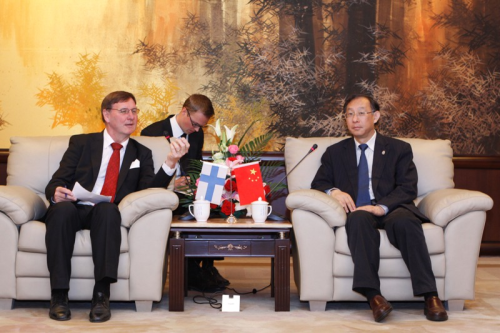
On the morning of May 31st, Mr. Jukka Gustafsson, Finnish Minister of Education and Science, paid a visit to Fudan University, accompanied by Mr. Matti Heimonen, Consul General of Finland in Shanghai, and Mr. Yang Weiren, Director of International Cooperation and Exchange Division, Shanghai Municipal Education Commission. Vice President Feng Xiaoyuan warmly welcomed Minister Gustafsson and his delegation.
After a brief review of the extensive collaborations between Finnish higher educational institutions and Fudan University through the bridge and platform of the Nordic Centre at Fudan University, both Minister Gustafsson and Vice President Feng expressed the desire to push for more exchanges and cooperation in a wide range of areas, including Arctic studies. It was also discussed to expand bilateral student exchanges in order to increase mutual understandings of the younger generation. Minister Gustafsson also asked about President Yang Yuliang’s visit to University of Helsinki and University of Turku in early May.
After the meeting, the delegation watched the photo exhibition of the Finnish explorer Carl Gustaf Emil Mannerheim’s trip to Western China during 1906 and 1908, which was on display at Fudan from late May to early June. Minister Gustafsson and his delegation also had a tour of the new Nordic Centre Building before leaving Fudan.
TOP
****************************************************************************************
Foreign Affairs Office, Fudan University
220 Handan Road, Shanghai 200433, China
Advisor: ZHU Chouwen
Editor-in-chief: XUE Hua
Contributor: CHEN Zhaojun
JING Ying
LIN Jieying
LIU Xiaohui
WANG Xi
WANG Ying
XU Yefang
XUE Hua
ZHAO Min
ZHAO Peiran
ZHANG Yingying
ZHU Yifei
Technical Support: LU Yinhui
****************************************************************************************
We apologize if our e-mail updates inconvenienced you in any way.
If you want to unsubscribe, send an email titled "Unsubscribe" and we will remove your email from the list.
Fudan University / Fudan FAO